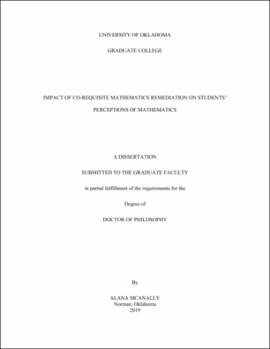| dc.description.abstract | Every year a significant portion of the college population is considered deficient in their mathematical skills and are deemed as needing some form of remediation before they can enroll in credit bearing courses. Traditional remediation, where students take their remedial courses as a series of prerequisites to their college mathematics gateway course, has proved to be unsuccessful (Bahr, 2008; Bailey, 2009; Bettinger & Long, 2009). The process of remediation is often too long with too many exit points so many students who need remediation never enroll let alone pass all the required gateway courses. Co-requisite remediation, where a student takes a gateway course along with a support course, serves the student with the dual purposes of supporting the student and significantly reducing the student’s time spent in remediation. Co-requisite remediation in mathematics has been shown to decrease the number of remedial courses and essentially eliminates the exiting points of the leaky pipeline (CCA 2016; Jones 2015). Therefore, co-requisite remediation can be the new bridge, providing equity for students deemed not college ready.
This mixed-methods study examines the mathematics self-efficacy of co-requisite College Algebra students using the Mathematics Self-Efficacy Scale (MSES). Participants in the study whose mathematical self-efficacy increased, decreased, or remained the same, were interviewed to give their personal insights and perceptions of co-requisite College Algebra. Analysis of the quantitative data revealed co-requisite College Algebra students have a statistically significant difference in their mathematics self-efficacy when compared to their non-co-requisite peers. The data also showed that over the course of a semester co-requisite College Algebra students’ mathematics self-efficacy does not significantly change. The qualitative data analysis revealed four main themes that emerged from the interviews of participants: community, multiple sources and multiple modes of instruction, support, and soft skills with sub-themes to support each major theme.
Keywords: remediation, co-requisite remediation, co-remediation, mathematics, self-efficacy, College Algebra | en_US |
